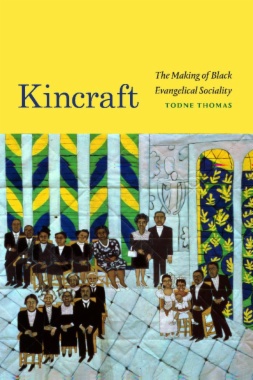In Kincraft Todne Thomas explores the internal dynamics of community life among black evangelicals, who are often overshadowed by white evangelicals and the common equation of the “Black Church” with an Afro-Protestant mainline. Drawing on fieldwork in an Afro-Caribbean and African American church association in Atlanta, Thomas locates black evangelicals at the center of their own religious story, presenting their determined spiritual relatedness as a form of insurgency. She outlines how church members cocreate themselves as spiritual kin through what she calls kincraft—the construction of one another as brothers and sisters in Christ. Kincraft, which Thomas traces back to the diasporic histories and migration experiences of church members, reflects black evangelicals' understanding of Christian familial connection as transcending racial, ethnic, and denominational boundaries in ways that go beyond the patriarchal nuclear family. Church members also use their spiritual relationships to navigate racial and ethnic discrimination within the majority-white evangelical movement. By charting kincraft's functions and significance, Thomas demonstrates the ways in which black evangelical social life is more varied and multidimensional than standard narratives of evangelicalism would otherwise suggest.
- Cover
- Contents
- Acknowledgments����������������������
- Introduction�������������������
- Part One. Contextualizing the Social Dimensions of a Black Evangelical Religious Movement
- 1. On “Godly Family” and “Family Roots”: Creating Kinship Worlds
- 2. Moving against the Grain: The Evangelism of T. Michael Flowers in the Segregated US South
- 3. Black Like Me? Or Christian Like Me? Black Evangelicals, Ethnicity, and Church Family
- Part Two. Scenes of Black Evangelical Spiritual Kinship in Practice
- 4. Bible Study, Fraternalism, and the Making of Interpretive Community
- 5. Churchwomen and the Incorporation of Church and Home
- 6. Black Evangelicals, “the Family,” and Confessional Intimacy
- Conclusion
- Notes
- References
- Index

